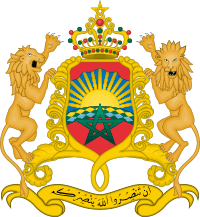Israel–Morocco relations
Moroccan–Israeli relations are the official relations between Israel and Morocco.
 | |
Morocco |
Israel |
|---|---|
While Morocco does not recognize Israel as a state, the relationship between the two was secretly maintained after the establishment of Israel in 1948. For many years, Hassan II had facilitated the secret relationship with Israel, and it was considered as instrumental in stabilizing Morocco and beating possible anti-royal threats within the country.[1] This secret relationship continues to play an important role in growing Israeli–Moroccan ties, despite the lack of formal relations. The Israeli passport is accepted entry to Morocco with a visa granted on arrival.[2]
History
Morocco, like many Arab countries, was formally at war with Israel since 1948, which culminated into the riots of Oujda and Jerada against Jews.[3] This prompted Jews to flee from the country.
However, under the reign of later King, Hassan II, it was characterized as controversial due to Hassan II's closeness with Israel. Hassan II was found to have invited Mossad and Shin Bet agents in the Arab League meeting held in Casablanca at 1965, and this was instrumental leading to the heavy military defeats of Egypt, Jordan and Syria to the Israelis at Six-Day War.[4] Prior to the war, King Hassan II had developed a reciprocal relationship with the Israeli intelligence, who had assisted him in carrying out an operation in France to abduct and 'disappear' Mehdi Ben Barka, a Moroccan dissident and left-wing opposition leader who had been based in Paris.[5] The close relations between Israeli and Moroccan leaders have become a subject for many years even within Moroccan society.
At 1975, the outbreak of Western Sahara War prompted Morocco to seek eventual and secret aids from Israeli intelligence, who had reorganized the Royal Moroccan Armed Forces and was thought to have helped building the Moroccan Western Sahara Wall, something neither Israel or Morocco acknowledged today.[6] During 1980s, Hassan II attempted to break the deadlock to recognize Israel by meeting with Israeli Prime Minister Shimon Peres in Rabat at 1986, but was met with backlash and protests from the Arab League and Moroccans alike, forcing Hassan II to withdraw his attempt.[7] Nonetheless, Hassan II maintained bond with Peres, and Peres voiced his condolence when Hassan II died in 1999.[8]
Today
Like late Hassan II, his son Mohammed VI of Morocco maintains this pragmatic approach and keeps the secret link between Morocco and Israel. Mohammed VI's advisor, André Azoulay, is an instrumental Jewish Moroccan who facilitated the growth of Morocco in both economic and political terms; while also maintaining good ties with Israel.[9]
Morocco also attempted to solve the Israeli–Palestinian conflict by dispatching another Jewish aide close to Israel, Sam Ben Shitrit, to solve the conflict and make peace between the two.[10]
Recently, due to the growing push of anti-Iranian sentiment on both sides, as both countries have problems with the Iranian regime led by conservative Islamists, Morocco and Israel have sought to make their ties closer. Both countries participated in February 2019 Warsaw Conference, aimed to be anti-Iranian. This was followed by suspicions and rumors over Morocco's attempt to normalize relations with Israel, which were caught up by protests.[11]
Jews in Morocco
Jews have a long historical presence in Morocco, where they are presently the largest Jewish community in the Arab World. The Moroccan government has tolerated its Jewish community, even after the establishment of the State of Israel in 1948, facilitating the secret tie between Israel and Morocco. Moroccan-organized Jewish emigration to Israel continued while still manage to maintain strong ties with the Israeli government through its remaining Jews.[12] Moroccan mellahs (Jewish Quarters) also exist in some cities.
Morocco is the only Arab nation to have a Jewish museum, which has been praised by Moroccans and Jewish communities alike. A large community of Moroccan Jews live around the world.[13]
See also
References
- https://www.independent.co.uk/news/world/the-two-faces-of-king-hassan-ii-1108656.html
- https://qz.com/1445321/what-its-like-to-travel-on-an-israeli-passport-as-a-palestinian/
- http://www.sephardicgen.com/databases/oujdaDjeradaSrchFrm.html
- https://www.timesofisrael.com/morocco-tipped-off-israeli-intelligence-helped-israel-win-six-day-war/
- https://en.yabiladi.com/articles/details/58726/history-1965-when-mossad-helped.html
- https://www.aljazeera.com/indepth/features/2015/05/western-sahara-struggle-freedom-cut-wall-150528065625790.html
- https://www.nytimes.com/1986/07/23/world/peres-and-hassan-in-talks-syria-breaks-moroccan-ties.html
- https://www.nytimes.com/1999/07/24/world/hassan-ii-of-morocco-dies-at-70-a-monarch-oriented-to-the-west.html?mtrref=www.google.com&gwh=53DFDDD1F9D29D7D9F1917C99B2C6EED&gwt=pay
- https://www.moroccoworldnews.com/2017/10/231187/andre-azoulay-audrey-azoulay-unesco/
- https://www.timesofisrael.com/moroccos-king-dispatches-jewish-aide-to-push-israeli-palestinian-talks/
- https://www.moroccoworldnews.com/2019/02/266108/morocco-israel-normalization-secret-meeting/
- https://interactive.aljazeera.com/aje/palestineremix/phone/return-to-morocco.html
- https://moroccotravelblog.com/2016/11/05/museum-of-moroccan-judaism-jewish-museum-in-casablanca/

